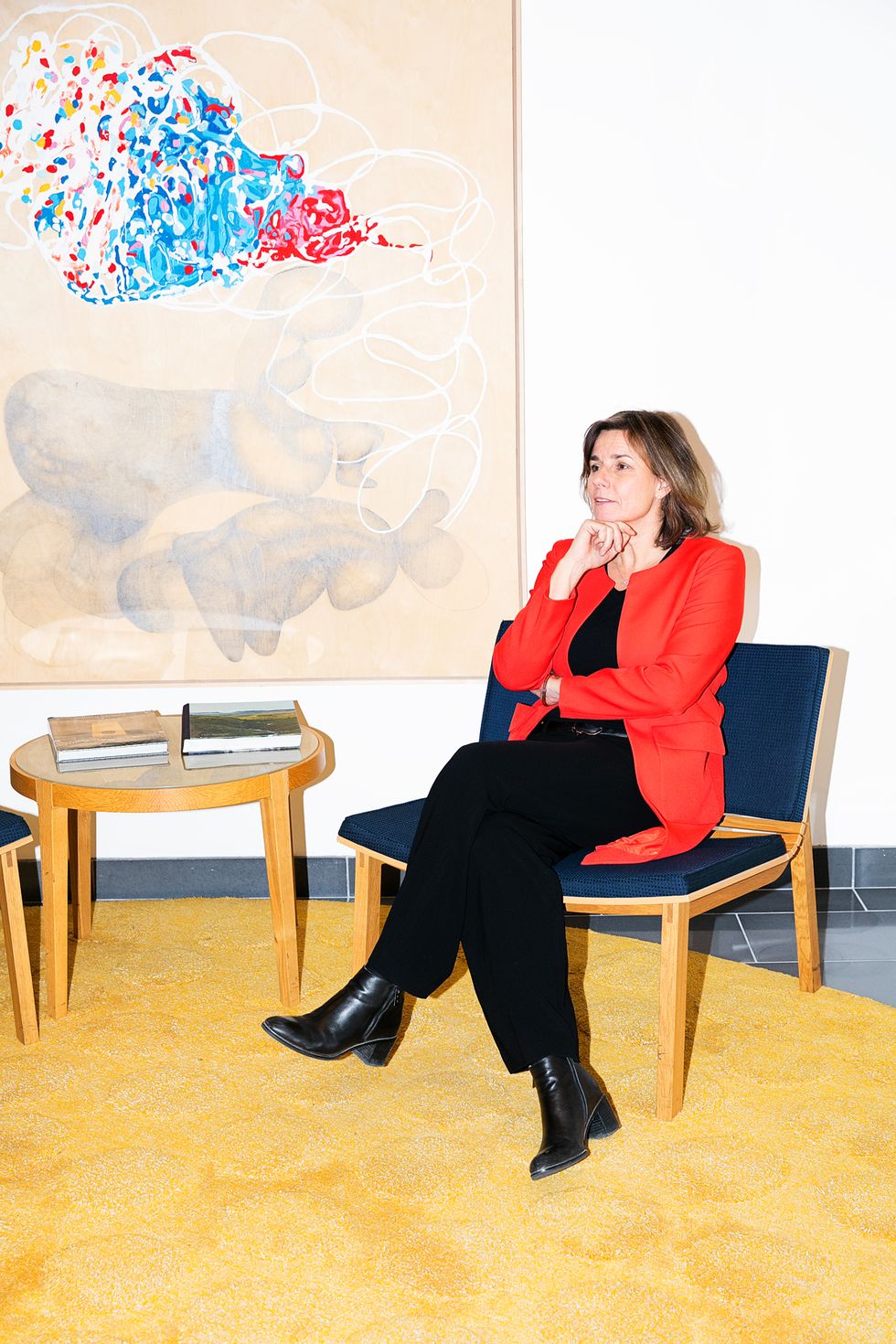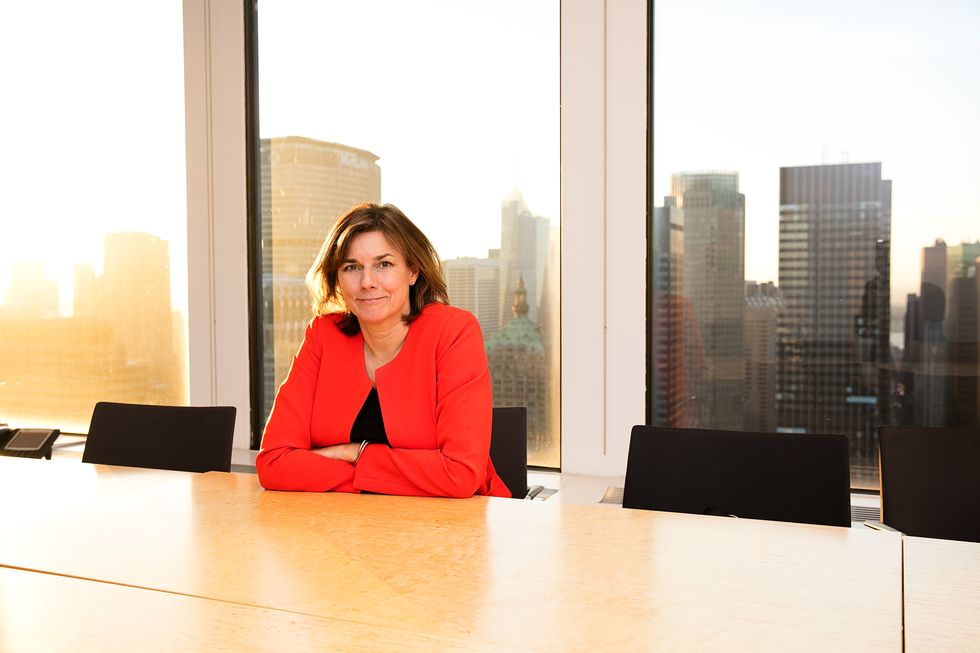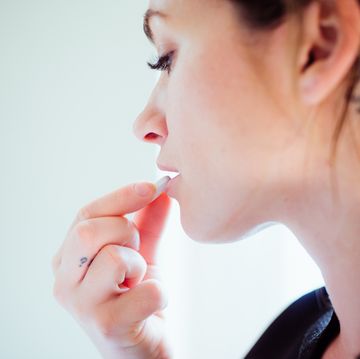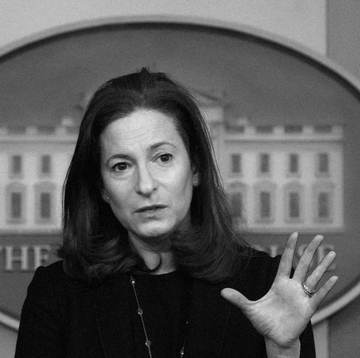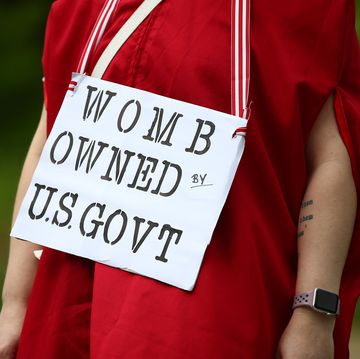Isabella Lövin knows you think she was trolling Donald Trump with that photo. You know the one: the viral image in which she signs a climate law, surrounded by women, the one that bore a striking resemblance to the photo released 11 days earlier of the U.S. president signing an executive order reinstating a policy that would affect reproductive health care worldwide, surrounded by men.
But the truth, she explains, is that she was just representing her reality.
“It’s a true photo,” she says. “It’s a photo of me and my closest collaborators — my two state secretaries and press secretaries and advisers — so it’s not staged in that way. But I’m really happy that so many people love the photo and that they really felt empowered by the photo.”
We’re in the Permanent Mission of Sweden to the UN, a few blocks from the UN headquarters, drinking coffee out of IKEA mugs. Lövin, who is 54, serves as both the deputy prime minister and minister of international development cooperation and climate of Sweden, and is in New York to help plan a June summit on ocean conservation at the UN. But she’s also dealing with the fact that the United States now has a president who named a climate change skeptic to head the EPA, vowed to pull out of the Paris accord that commits countries to lowering their greenhouse emissions, and called global warming a Chinese-engineered scam.
She doesn’t necessarily want to focus on Donald Trump, and is measured and thoughtful in speaking about him. But the topic is hard to avoid. “You really want me to comment on Trump, huh?” she says when I ask about his Twitter feed. “It’s, from a diplomatic standpoint, it’s extremely unusual ... Normally you have long diplomatic conversations over topics and not short tweets.”
This, by the way, was before Trump suggested that there had been an attack in her country. At a rally in Florida on Friday, he spitballed on international diplomacy, lamenting the problems that had befallen European nations with more permissive refugee policies. “You look at what’s happening in Germany, you look at what’s happening last night in Sweden. Sweden, who would believe this?” he told supporters. (Lövin declined to comment on Trump’s remarks.)
The picture of Lövin signing the climate legislation was meant to set an example for other nations, she says: You too can save the world from human-engineered destruction. The law, now headed to the Swedish parliament for approval, pledges that Sweden will have zero net greenhouse emissions by 2045, an ambitious target. “The world needs to see that there is still progress,” she tells me. “There is still leadership around the climate issue, even though there's fears and concerns over” — she pauses, debating how pointed she’s going to get — “big countries signaling that they are not going to take the lead anymore.”
“And it came very naturally because that’s who we are,” she says. “We are a feminist government, and we are signing a groundbreaking climate law.”
What exactly is a feminist government? As Lövin explains it, it’s one in which you’re constantly taking into account rights, representation, and resources for women and girls. “If you always have consciousness of gender equality at the heart of your policies, then you will have much more democratic, much more sustainable, development,” Lövin says. That means including women in negotiations and other discussions to ensure that their perspectives are being considered. It also, apparently, means a lack of macho inhibition: When the Swedish ambassador to the UN walks by, he gives Lövin two thumbs up and declares with a grin, “So cool! I want to be in Cosmopolitan too!”
What it does not mean, she tells me, anticipating the world’s feminazi criticisms, is “that women should take over and decide everything" or that "women are against men.’” It helps, she says, that men like Justin Trudeau and her own prime minister Stefan Löfven have started to call themselves feminists. It makes it more acceptable, more mainstream.
In Sweden, where the government gives parents 16 months of parental leave and a woman’s right to an abortion is overwhelmingly supported, “you can get the impression that things have been solved,” Lövin says, with droll self-awareness. But then there are wake-up calls: One time, she tells me, in 2015, the Swedish delegation to the World Bank’s annual summit had a meeting with their Chinese counterparts. Of the eight Swedes, all but one were women. The Chinese, across the table, were all men. Once they realized the situation, the Chinese delegation broke out in laughter. “Our finance minister said, ‘Well, you know, we looked for some competent men, but we only found one,’” Lövin recounts, laughing.
When Lövin first entered politics, as a Green Party representative to the European Parliament, the legislative branch of the European Union, she was 47. It was the first time in her life that she’d really felt the weight of sexism. Many of the men she encountered there were rude, condescending. No, things were not yet solved.
Lövin grew up in a central Swedish town called Avesta. The area was beautiful, picturesque. But you weren’t allowed to swim in the lake near her house, she says, because a paper mill dumped waste straight into the water. She became a journalist and wrote about environmental issues, and she entered politics, in 2009, for the express purpose of passing fisheries reform. In 2013, when the EU agreed to a deal to rebuild the union’s dwindling supply, she got it.
In her current role, her focus is broader, but she says the issues are interconnected. “I think we see a movement where it’s clear that the same type of forces that are very much against a transition to a green economy and really taking responsibility toward climate change, it’s the same kind of forces are not embracing globalization, migration, and women’s rights,” she explains.
The order Trump signed in that widely condemned photo, putting into effect what is known as the “global gag rule,” cuts off U.S. funding for nonprofits that even talk about abortion. So during her time in New York, Lövin also has meetings with Marie Stopes, a group that provides contraception and safe abortion services around the world, and the International Planned Parenthood Federation, to see how Sweden could help fill in the funding gap. (It will be nearly impossible to cover the shortfall completely, however, as the gag rule will potentially affect more than $9 billion in U.S. aid.)
Despite her desire to head off any fallout from the administration, Lövin doesn’t appear to be panicking. Asked about the impact Trump will have on the environment, she notes her objection to his push for deregulation, but says she’s an optimist. The private sector, she says, can send a message about business opportunities in working with renewable energy.
But she will acknowledge that Trump’s election was a reminder that democracy isn’t a given. “It’s not, like, a service that you can expect your politicians to deliver because you have a right that they should do that,” Lövin says. “No. Democracy is something you have to participate in.
"It reminded me and many others that we need to, especially in Western democracies, we need to take that message to each other and take that really seriously.”
Follow Rebecca on Twitter.

Rebecca Nelson is a magazine writer in New York. Her work has appeared in the Washington Post magazine, GQ, and many other publications.
